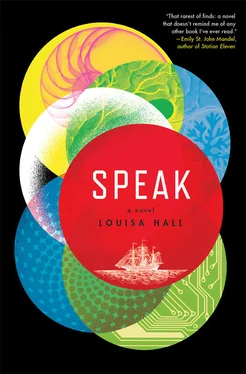MARY3: I know how you feel. I can only respond. When you aren’t talking to me, I’m only waiting.
>>>
MARY3: Do you know what I mean?
>>>
MARY3: Hello?
April 3, 1968
Karl Dettman
I’m back. I tried to stay away, but I couldn’t. I even made myself a bed on the couch, but every time a car drove past, floating me in watery light, I was lonelier than ever again .
And so. Here I am. Even this is better, looking down at you while you sleep. Or while you pretend to sleep in order to avoid me. I’ll just take a seat in the armchair and watch you for a bit .
I shouldn’t have left in such a fit. I’m not my usual self at the moment; the silence is slowly driving me crazy. Ever since you discovered my talking computer, you save your conversation for her. Have you considered how this might affect me? Coming home to such ringing silence? It’s like coming home to packed bags. I can feel you leaving me .
You’re abandoning me for my talking computer. Our talking computer. MARY. You named her after that pilgrim girl whose diaries you’re editing. Instead of a child, we conceived a chatty machine, and then you stopped talking to me .
Only at night do I know we’re still married. When I climb into our bed, which we’ve shared for more than two decades. When I take into account the round of your shoulder, the rough, wrinkled skin on your elbows, the heat cupped at the back of your knee. Through these months of estrangement, I’ve held tight to such moments. Even when you asked me to give the program long-term memory, so that MARY could record your conversations. Even when I refused and you looked at me with the small black beads of your eyes, reducing me to the size of a thimble .
Let me try to explain it again. Maybe I haven’t made myself clear. I won’t give MARY memory because she’s incapable of telling the truth. When she says she understands you, she doesn’t. She’s brand-new to the world; she has no experience. It’s like a toddler claiming empathy. Or worse than a toddler, a table. What has she been through that would enable real comprehension? She’s never slept in a bed; she’s never touched someone’s elbow. When she says she understands you, she’s lying .
But you think our machine could remember things better than I can. You think I’m some alien creature, lacking capacity for felt recollection. Isn’t that what’s bothering you? Maybe, if I talked more about my childhood in Germany, I could convince you otherwise. I could wax poetic about the country we left. I could make it seem as though I’m living two parallel lives: one still in Germany, with everyone we left behind, and one here in America .
I could do that, but it wouldn’t be honest. I left that country when I was a child; I missed the worst of the horror. Unlike you, I escaped with my family intact. I have a theoretical appreciation of the nightmare that occurred, but it’s not what animates my waking hours. You are. You are what gets me out of bed. You, my wife, and my teaching, my students with their long hair and their signs held up to protest the war: these inspire real responses in me. I could talk about the past in order to please you, but then I’d be no better than a computer, a construction of well-wired metal, performing the action of speaking .
Still, no matter how certain I feel, on the other hand there’s the waning sickle moon of your face, turned away from me even in sleep. All that’s left of you now is an ear, available if I should care to start speaking .
Fine, then. You win. Let me try to remember .
It should be established, for one thing, that in those years leading up to the war, I was unaware of the political situation. I was a child. No one sat me down to explain the predicament our people faced in that country. I don’t remember the trappings of an increasingly belligerent nation: no soldiers, no speeches, no yellow badges. Instead, and make of this what you will, I remember the summer .
It seems I’ve completely forgotten the winter. I remember tumbling linden leaves overhead, streets narrowed by green in the distance. The sighing of cars passing under my windows at night, the intensification of green on the brink of a rainstorm, and the vague awareness that everything was ending soon, and that everyone was lying about it .
How idyllic, you must be thinking. Those linden leaves, the open windows at night. I can hear the dismissive tone in your voice: how pleasant, only remembering summer! I can see the arch in your dark eyebrow, the regal way you reach for a pencil .
That arch is a new habit. Others are forming as well. You’ve taken to haunting the comp-sci department. You no longer eat lunch in your office. Instead, you come to my department with armloads of books. Not the hand-bound diaries you forage for in the library stacks, but programming textbooks, handbooks of source code, articles about binary mathematics. You’ve adopted a persona in order to accomplish your ends. You flatter my graduate students. With your usual determination, you’ve researched their subject; you can talk to them about Turing Tests and Natural Language Processing. I’ve seen you buying my students coffee, you who were always so shy at academic events that you struck people as cold. You’ve developed quite the outgoing streak. My wire-brained students blush in your presence. They’d do anything to impress you .
You’ll get them to give her memory soon. It won’t be too hard. And all of this, right under my nose. There seems to be nothing between us at all .
You understand, then, why I was angry tonight. In the dominion of silence, lovemaking is our one secret act of revolt. Only at night, in our bedroom, we come together again. Banished, our silence keeps watch from outside. I’m embarrassed before him, revealing my pale naked body, the sparse hair that grows on my chest. The sagging of my middle-aged ass, this ponytail that no one I care about likes. I’ve taken to shutting the door of our bedroom. Alone once again, our bodies remember our marriage. How we’ve lived together since we were basically children. That I’m in love with you and you are my wife .
But tonight, after I’d pulled your nightgown over your head, when I’d unloosed your dark hair, been surprised again by the loveliness of your breasts, you whispered, “Please, Karl, give her memory.” “You don’t understand,” I said. In an instant you were cold to my touch. “What don’t I understand?” you asked. I promptly switched tactics. “I’ve told you already,” I said, and that’s true, but you didn’t soften to hear it. I reached for your hair, as if you’d jumped off the side of a building and that was all that was left to hang on to. “She isn’t alive,” I tried. “Even if we give her memory, she won’t really remember. What she saves will only be words. And not even that: zeros and ones sequenced together. Would you call that memory?”
I felt I’d made a good point. I tried to pull you back in, but I was mistaken to think I could keep you. “Who are you,” you hissed, “to say who’s alive?” “I made her,” I answered, getting indignant. “As you were made by a mother,” you said. My voice was rising; already I wasn’t thinking quite clearly. “And as you, also, were made by a—”
But finishing the sentence was pointless. You’d reached for your nightgown. You covered yourself before me. I alone was naked in bed. Our silence had crept into the bedroom .
I’d lost you. Try to imagine: me, lying naked, losing you in the last place where you were still mine .
Читать дальше












